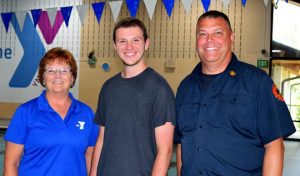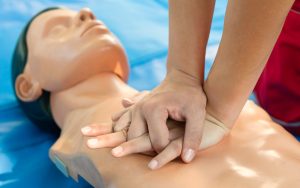Y employees use AED to save life

Critical seconds tick away. Training takes over. Josh Eckstein, a lifeguard at the Southeastern Indiana YMCA, knew what to do while on duty one morning in late July when he saw a Y member start to go under the water, says marketing coordinator Kathleen Bohman.
He immediately put the YMCA emergency protocols into action, pulling the member out of the water to perform CPR while Connie Fledderman, Welcome Center staff member, called EMS and came to assist Eckstein with the automated external defibrillator.
More than 350,000 cardiac arrests happen outside of hospitals each year, and 90 percent of Americans who experience out-of-hospital cardiac arrests die. However, the American Heart Association estimates that properly administered CPR can triple a person’s odds of survival. Sadly, only 46 percent of cardiac arrest victims get CPR from a bystander.

“I had no idea what was in store for me as I swam my regular laps that day,” recalls the Y member. “My heart stopped beating. Had this happened to me anywhere other than the Y, I may not be here to be able to talk about my good outcome.”
Y executive director Angie Harmeyer says, “In addition to our lifeguards being certified by the American Red Cross, we require all YMCA staff to be first aid/CPR/AED trained within the first 30 days of employment, followed by regular recertifications and in-service trainings. Providing a safe environment for our members and guests is everyone’s job. That also means being prepared.”
Why is CPR/AED training important?
1) By performing simple procedures and following certain guidelines, it may be possible to save lives by giving basic treatment until professional medical help arrives.
2) In an emergency, there’s no time to read instructions.
3) If you’ve memorized some of the basic procedures, it will help you react quickly and efficiently.
4) It can make the difference from complete recovery and permanent disability.
5) It can help save a life.
“Josh and Connie showed exactly why we put such an emphasis on CPR training for all city employees, companies and the general public who are eager to be certified,” said Batesville Fire Chief Todd Schutte. “Through their immediate response and actions, the patient survived the incident and is on the road to a full recovery.”
Call Now to speak with a UniFirst First Aid + Safety CPR/First Aid/AED Specialist
Click Here to learn more about AED/CPR/First Aid training
Click Here for webChat
If you liked this post be sure to follow us:
Source: https://www.batesvilleheraldtribune.com/news/local_news/y-employees-use-aed-to-save-life/article_0d8867d8-c376-11e9-a09b-37d70bfea96b.html
